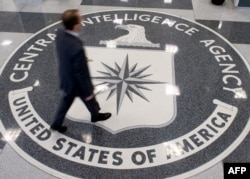U.S. CIA Director John Brennan says his agency would not use waterboarding against a detainee, even if a future president ordered such interrogation techniques.
"Absolutely, I would not agree to having any CIA officer carrying out waterboarding again," he said in an interview with NBC News, a portion of which aired Sunday.
Brennan said he would not use the tactics "because this institution needs to endure."
The CIA used a program of harsh interrogations aimed at forcing terror suspects to give up information about possible attacks against the United States in the years following the 2001 terror attacks that killed nearly 3,000 people in the U.S.
President Barack Obama banned the techniques when he took office in 2009, saying many of them amounted to torture.
Republican presidential candidate Donald Trump said last month he would "use every legal power" to stop terrorists, but would not order the military or others to violate the law. He had earlier supported going "tougher than waterboarding." His closest challenger in the race, Senator Ted Cruz, said in February he would bring back "whatever enhanced interrogation methods" are necessary to keep the country safe.
Brennan's stance has evolved since the Senate released a report in December 2014 criticizing the CIA's use of waterboarding, mock executions, ice baths, sexual threats and other techniques against captured al-Qaida members and other militants. The report said the interrogations failed to produce any life-saving intelligence.
Brennan said after the report's release that he would "defer to future policymakers in future times" on whether the techniques would be used again. He also said the interrogations had, in fact, produced intelligence that helped thwart attack plans and capture terrorists.
Others have defended the program as necessary for national security. Former vice president Dick Cheney, who was in office when then-president George W. Bush authorized the methods, said they kept the country safe from more attacks. Jose Rodriguez, who ran the interrogation program for the CIA, said information obtained through the interrogations helped lead to the capture of the self-proclaimed architect of the September 11 attacks, Khalid Sheikh Mohammed.
Mohammed is one of the remaining detainees at the U.S. military detention center in Guantanamo Bay, Cuba, a facility that Obama wanted to close during his presidency. The U.S. government has tried prosecuting some of the detainees, but legal analysts say that process is complicated because some of the prisoners were subjected to enhanced interrogations that included waterboarding.
Two U.S. Air Force psychologists who designed the CIA's program are also facing a lawsuit filed on behalf of three suspected terrorists who were detained but never charged with crimes. The ACLU brought the suit last October, accusing the psychologists of personally taking part in torture sessions under a program that was "unlawful and its methods barbaric." That case is still moving through the U.S. District Court for the Eastern District of Washington.













